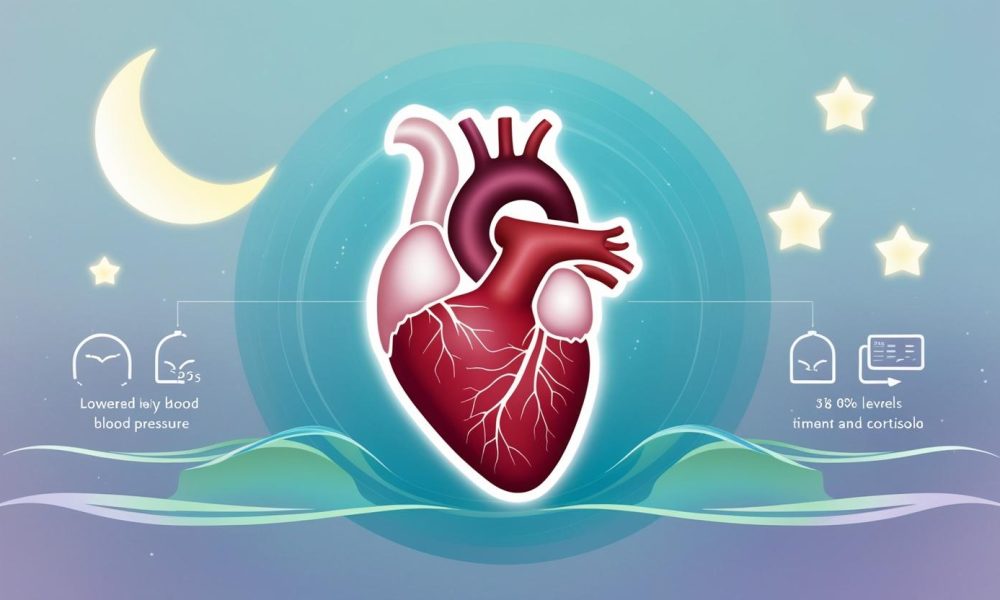Impact of Sleep on Heart Health
The impact of sleep on heart health is profound. Consistent, high-quality sleep lets your cardiovascular system downshift—lowering blood pressure, steadying heart rate, and reducing inflammation—so you wake up more resilient.
Key Takeaways: Impact of Sleep on Heart Health
- Regular, high-quality sleep reduces long-term risks of hypertension, heart disease, and stroke.
- Poor or irregular sleep increases blood pressure, inflammation, and the likelihood of arrhythmias.
- Optimizing your bedroom environment and daily rhythm amplifies the impact of sleep on heart health.
Why Sleep Is a Heart’s Best Ally
Answer first: Good sleep is active repair time for your heart. During deep sleep, heart rate and blood pressure dip, while stress hormones stabilize—giving arteries a nightly break.
Those predictable “restorative dips” matter. Over months and years, they reduce vascular strain, keep endothelial tissue healthier, and curb inflammation that can damage arteries.
For a practical overview of how sleep supports cardiovascular function, see the Sleep Foundation’s explainer on sleep and heart health
(How Sleep Deprivation Affects Your Heart).
What Happens When You Shortchange Sleep?
Answer first: Skimping on sleep raises blood pressure, stokes inflammation, and disrupts healthy autonomic rhythms—conditions that elevate cardiovascular risk.
- Higher blood pressure: Without adequate deep sleep, your autonomic nervous system doesn’t fully downshift, so BP remains elevated across the 24-hour cycle.
- Inflammation overload: Poor sleep elevates markers like C-reactive protein, accelerating arterial wear and tear.
- Arrhythmias and oxygen stress: Sleep apnea and fragmented sleep trigger oxygen dips and irregular heart rhythms.
Learn more about the sleep–heart connection, including sleep apnea’s role, from Sleep Foundation (Sleep Apnea and Heart Disease).
How Much Sleep Do Adults Really Need?
Answer first: Most adults do best with 7–9 hours per night, but consistent timing and quality stages (deep and REM) matter as much as minutes.
Regular bed and wake times reinforce circadian rhythms, making those healthy blood pressure dips more reliable. To fine-tune habits, start with Sleep Foundation’s sleep hygiene guidance (Mastering Sleep Hygiene).
Create a Heart-Smart Bedroom
Answer first: The right environment makes deep, undisturbed sleep more likely, which strengthens cardiovascular benefits night after night.
Choose breathable, low-toxin bedding: Favor organic cotton, linen, or bamboo. Look for certifications such as GOTS or OEKO-TEX to reduce off-gassing and potential irritants. Explore materials and construction in our guide (Bedding Science for Better Sleep).
Set the mood: Keep the room cool (about 60–67°F), use blackout curtains, and shift to warm, dim light an hour before bed. For design ideas that support rest, Better Homes & Gardens offers practical tips (Calming Bedroom Colors).
Control noise and light: White noise or gentle soundscapes can mask disruptions. If you’re curious about tools and techniques, see our primer on sound solutions (Sleep Sound Solutions).
Invest in sustainable, solid furniture: Less off-gassing and better durability can support healthier air and sleep. Browse eco-friendly frame ideas here (Sustainable Bed Frames).
Daily Habits That Strengthen the Sleep–Heart Link
Answer first: Small, repeatable habits—timing, light, movement—compound into big cardiovascular wins.
- Keep a steady sleep–wake schedule, even on weekends.
- Limit caffeine and alcohol later in the day.
- Get morning sunlight and daytime movement to anchor circadian rhythms.
- Use a short wind-down: light stretch, journaling, or breathwork.
- Reserve bed for sleep and intimacy; park screens elsewhere.
For a checklist you can follow tonight, see Sleep Foundation’s practical tips
(How to Sleep Better: 20 Tips).
Eco-Friendly vs. Conventional Bedding: Why It Matters
Answer first: Breathable natural fibers and trusted certifications can reduce irritants, regulate temperature, and help you stay asleep—supporting heart health.
Materials: Organic cotton, linen, and bamboo wick moisture and help maintain cooler skin temperatures, reducing wake-ups. Conventional synthetics and heavy chemical finishes may trap heat and off-gas.
Certifications: Look for GOTS and OEKO-TEX labels; they signal rigorous standards for harmful substances. If you’re comparing options, Parachute’s guides to organic textiles are a helpful primer (Best Organic Bed Sheets).
Buying smart: Prioritize clear material disclosures and avoid strong fragrance additives in detergents and softeners. For an at-a-glance benefits overview, start here (Organic Bedding Benefits) and dive deeper with our full buyer’s guide (Guide to Organic Bedding).
Who Is Most Affected by Poor Sleep?
Answer first: Some groups face higher stakes from sleep loss and irregular schedules, making heart-protective habits even more critical.
- Shift workers with rotating or overnight schedules.
- Older adults whose sleep is naturally lighter and more fragmented.
- People with hypertension, diabetes, or metabolic syndrome.
- Women, especially those with undiagnosed insomnia or sleep apnea.
If snoring, witnessed apneas, or daytime sleepiness are common, speak with a clinician about screening for obstructive sleep apnea; effective treatment can reduce cardiovascular risk.
FAQ
- Can lack of sleep cause a heart attack?
- Over time, yes. Chronic sleep deprivation elevates blood pressure and inflammation, which increases the likelihood of heart attack and stroke.
- How does sleep apnea affect heart health?
- Repeated oxygen dips and arousals strain the cardiovascular system, raising risks for hypertension, arrhythmias, and heart disease.
- Are naps good for your heart?
- Short naps (under ~30 minutes) can be restorative. Long or irregular naps, however, can disrupt nighttime sleep and blunt its cardiovascular benefits.
Final Thoughts
The impact of sleep on heart health is anything but optional—it’s foundational. Every consistent night helps your blood pressure downshift, calms stress hormones, and gives arteries a chance to recover. If you’re upgrading your sleep routine, consider breathable, certified bedding and a quieter, darker room. For eco-friendly furniture choices that support deeper rest, explore our
Sustainable Bed Frames guide.
Related Reading
From Cozy Bed Quarters
- Unravel the Secrets of Bedding Science for Sleep
- Temperature-Regulating Bedding: Sleeping Cool and Comfortable
- Organic Bedding Benefits: 7 Surprising Reasons























